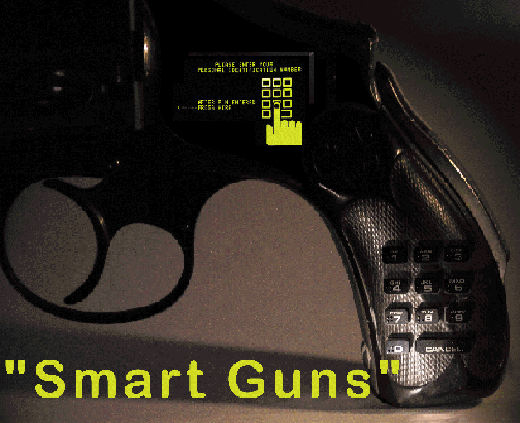
by any other name still has the same devastating results.
By Dave Kopel
"Smart Guns" is a slang term for a hypothetical firearm that incorporates computer technology so that the gun can be fired only by the authorized user. When used by the gun prohibition groups and their political allies, the term is a euphemism for "gun prohibition." And, as recently enacted by the New Jersey legislature, it is premised on the idea that using a firearm for protection is immoral, unless you are a government employee.
In December 2002, New Jersey Gov. James McGreevey signed bill S. 573/890, a ban on the retail sale of currently existing models of handguns. The law makes the ban go into effect three years after "at least one manufacturer has delivered at least one production model of a personalized handgun to a registered or licensed wholesale or retail dealer in New Jersey or any other state."
In other words, the availability of one model of "personalized handgun" for sale, anywhere in the United States, sets in motion a ban on the retail sale of any of the thousands of handgun models that are currently legal. (There are some exceptions for antiques and competition models.)
Banning the sale of every handgun except one or a few models isn`t quite as complete a form of prohibition as banning the sale of all handguns. But it`s pretty close.
The pretext for this new form of handgun prohibition is, supposedly, "for the children." In truth, fatal gun accidents involving children are at an all-time recorded low. In New Jersey, the Department of Health reported zero children in New Jersey killed in firearms accidents in 1998 and 1999, the last years for which detailed statistics are available.
Many legislators, however, are misled by claims from gun prohibition groups claiming that, "12 children a day are killed by guns." This factoid is manufactured only by counting an 18-year-old gangbanger shot while trying to rob a liquor store as "a child killed by a gun."
New Jersey Gov. McGreevey called the gun prohibition law "common sense," but rather significantly, McGreevey`s "common sense" will be imposed only on the taxpayers of New Jersey, not on his taxpayer-paid bodyguards.
When the personalized gun bill was moving through the New Jersey Assembly, it was amended to ensure that its provisions would apply to police as well as the public. The state and local police absolutely refused to be forced to use unproven technology. They did not want their lives to depend on a gun that is as reliable as their computer; a less than 100 percent rate of proper functioning just isn`t good enough when one`s life is in danger.
Indeed, the New Jersey ban goes into effect regardless of whether the first personalized handgun functions properly at a 99.998 percent rate or an 80 percent rate. In October 2001, the New Jersey Institute of Technology, a university that is using government grants to promote personalized gun technology, admitted that the best fingerprint recognition system currently worked only 80 percent of the time.
New Jersey`s personalized gun law states: "The provisions of this section shall not apply to handguns to be sold, transferred, assigned and delivered for official use to: (1) State and local law enforcement officers of this State; (2) federal law enforcement officers and any other federal officers and employees required to carry firearms in the performance of their official duties; and (3) members of the Armed Forces of the United States or of the National Guard."













 More Like This From Around The NRA
More Like This From Around The NRA








